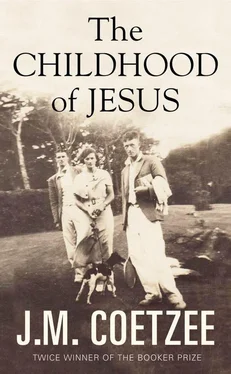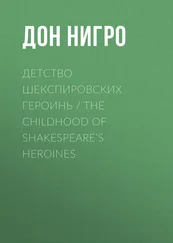‘No. I want to go with Inés and Diego in the car. I want to be a gypsy.’
He turns back to Inés. ‘I plead with you, Inés, think again. Don’t go ahead with this reckless move. There must be a better way.’
Inés pulls herself erect. ‘Have you changed your mind yet again? You want me to give up my child to strangers — give up the light of my life? What kind of mother do you think I am?’ And to the boy, ‘Go and pack your things.’
‘I’m finished packing. Can Simón swing me before we go?’
‘I’m not sure I can swing anybody,’ says he, Simón. ‘I don’t have my old strength, you know.’
‘Just a little. Please.’
They make their way down to the playground. It has been raining; the seat of the swing is wet. He wipes it dry with his sleeve. ‘Just a few pushes,’ he says.
He can push with only one hand; the swing barely moves. But the boy seems happy. ‘Now it’s your turn, Simón,’ he says. With relief he settles into the swing and allows the boy to push him.
‘Did you have a father or did you have a godfather, Simón?’ asks the boy.
‘I am pretty sure I had a father, and he pushed me on the swings just as you are pushing me. We all have fathers, it’s a law of nature, as I told you; unfortunately, some of them vanish or get lost.’
‘Did your father push you high?’
‘To the very top.’
‘Did you fall?’
‘I don’t remember ever falling.’
‘What happens when you fall?’
‘It depends. If you are lucky you just get a bump. If you are unlucky, very unlucky, you can break an arm or a leg.’
‘No, what happens when you fall ?’
‘I don’t understand. Do you mean, while you are falling through the air?’
‘Yes. Is it like flying?’
‘No, not at all. Flying and falling aren’t the same thing. Only birds can fly; we human beings are too heavy.’
‘But just for a little, when you are high up, it is like flying, isn’t it?’
‘I suppose so, if you forget you are falling. Why do you ask?’
The boy gives him an enigmatic smile. ‘Because.’
On the stairs they meet a grim-faced Inés. ‘Diego has changed his mind,’ she says. ‘He is not coming any more. I knew this would happen. He says we must catch a train.’
‘Catch a train? To where? To the end of the line? What will you do when you get there, you and the child alone? No. Telephone Diego. Tell him to bring the car. I will take over. I have no idea where we will go, but I will go with you.’
‘He won’t agree. He won’t give up the car.’
‘It is not his car. It belongs to all three of you. Tell him he has had it long enough, it is your turn now.’
An hour later Diego turns up, surly, itching for a fight. But Inés cuts short his grumbling. Dressed in boots and overcoat, he has never seen her behave so imperiously before. While Diego stands by, his hands thrust in his pockets, she lifts a heavy suitcase onto the roof of the car and ties it down. When the boy comes dragging his box of found objects, she shakes her head firmly. ‘Three things, no more,’ she says. ‘Small things. Choose.’
The boy selects a broken clock mechanism, a stone with a white seam in it, a dead cricket in a glass jar, and the parched breastbone of a gull. Calmly she picks up the bone between two fingers and tosses it away. ‘Now throw the rest in the rubbish bin.’ The boy stares, dumbstruck. ‘Gypsies don’t carry museums with them,’ she says.
At last the car is packed. He, Simón, climbs gingerly into the back seat, followed by the boy, followed by Bolívar, who settles at their feet. Driving much too fast, Diego takes the road to La Residencia, where without a word he gets out, slams the door to, and stalks off.
‘Why is Diego so cross?’ asks the boy.
‘He is used to being the prince,’ says Inés. ‘He is used to getting his own way.’
‘And am I the prince now?’
‘Yes, you are the prince.’
‘And are you the queen and Simón the king? Are we a family?’
He and Inés exchange glances. ‘A sort of family,’ he says. ‘Spanish doesn’t have a word for exactly what we are, so let us call ourselves that: the family of David.’
The boy settles back in his seat, looking pleased with himself.
Driving slowly — he feels a jab of pain each time he changes gear — he leaves La Residencia behind and begins to search for the main road north.
‘Where are we going?’ asks the boy.
‘North. Do you have a better idea?’
‘No, but I don’t want to live in a tent, like in that other place.’
‘Belstar? Actually, that is not a bad idea. We can head for Belstar and catch a boat back to the old life. Then all our worries will be over.’
‘No! I don’t want an old life, I want a new life!’
‘I was just joking, my boy. The harbour master at Belstar won’t let anyone take the boat back to the old life. He is very strict about that. No return. So it’s either a new life or else the life we have. Any suggestions, Inés, for where to find a new life? No? Then let us keep going and see what comes up.’
They find the highway north and follow it, first through the industrial suburbs of Novilla, then through ragged farmland. The road begins to wind into the mountains.
‘I need to poo,’ announces the boy.
‘Can’t it wait?’ says Inés.
‘No.’
There is, as it turns out, no toilet paper. What else, in her haste to be off, has Inés forgotten to bring?
‘Do we have Don Quixote in the car?’ he asks the boy.
The boy nods.
‘Will you give up a page of Don Quixote ?’
The boy shakes his head.
‘Then you will just have to have a dirty bum. Like a gypsy.’
‘He can use a handkerchief,’ says Inés stiffly.
They stop; they drive on. He is beginning to like Diego’s car. It may not be much to look at, it handles clumsily, but the engine feels quite sturdy, quite willing.
From the heights they descend into rolling scrubland with dwellings scattered here and there, very different from the sandy wastes south of the city. For long stretches theirs is the only car on the road.
They strike a town named Laguna Verde (why? — there is no lagoon), where they fill the tank. An hour passes, a full fifty kilometres, before they reach the next town. ‘It’s getting late,’ he says. ‘We should look for a place to spend the night.’
They coast down the main street. There is no hotel to be seen. They stop at a filling station. ‘Where will we find the nearest lodgings?’ he asks the attendant.
The man scratches his head. ‘If you want a hotel, you will have to go on to Novilla.’
‘We have just come from Novilla.’
‘Then I don’t know,’ says the attendant. ‘People usually just camp out.’
They return to the highway, into the gathering night.
‘Are we going to be gypsies tonight?’ asks the boy.
‘Gypsies have caravans,’ he replies. ‘We have no caravan, just this cramped little car.’
‘Gypsies sleep under hedges,’ says the boy.
‘Very well. Tell me when next you see a hedge.’
They have no map. He has no idea what lies ahead on the road. In silence they drive on.
He glances over his shoulder. The boy has fallen asleep, his arms around Bolívar’s neck. He looks into the dog’s eyes. Guard him , he says, though he utters no word. The icy amber eyes stare back at him, unblinking.
He knows the dog does not like him. But perhaps the dog likes no one; perhaps liking is outside the range of his heart. What does it matter anyway, liking, loving, compared with being faithful?
‘He is asleep,’ he tells Inés, speaking softly. And then: ‘I am sorry it has to be me coming with you. You would have preferred your brother, wouldn’t you?’
Читать дальше












